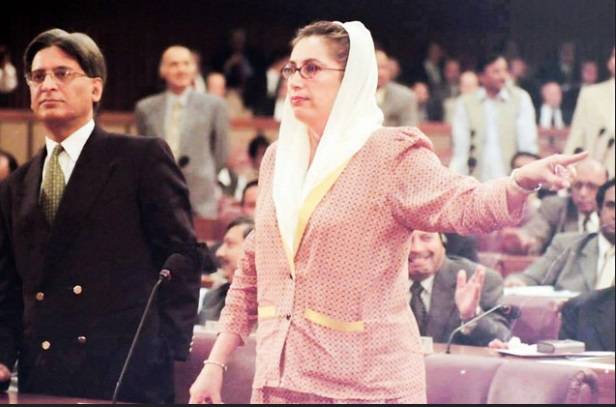
Kamran Shafi, who was the press secretary to prime minister Benazir Bhutto in her first government, said that the Pakistan People's Party (PPP) government was maligned through 'engineered stories' that were published in most newspapers at the behest of the president and the army chief.
Speaking in a Naya Daur web show alongside senior journalists Umber Khairi, Muhammad Ziauddin, Murtaza Solangi and Naya Daur Editor Raza Rumi, Shafi said Benazir was opposed by the factions in the army and establishment who were closed to military dictator Ziaul Haq. The panel had gathered to discuss the dismissal of Benazir's first government on Aug 6, 1990.
"It was very brave of Benazir to survive in the Prime Minister's House for two years despite such vehement opposition," he added.
He said the planted stories came out of the presidency and the General Headquarters. At the time, Gen Aslam Beg was the army chief while Ghulam Ishaq Khan was the president.
Muhammad Ziauddin also said that the newspapers were used to plant 'engineered' stories to damage the reputation of the BB's government. He went on to claim that the story published in The Nation foretelling her ouster was also planted by the powers-that-be in a bid to hurt the PPP government.
Calling her a true democrat, Ziauddin said Benazir had a respect for the press and never persecuted anyone on this basis.
Umber Khairi said the story of her dismissal was quite interesting because it gives us an insight into the sort of opposition a civilian government faced in the 90’s from an establishment dominated by supporters of General Zia and the army, and the role of media in political maneuvering and machinations.
Ziauddin further said that Benazir had always been considered a 'security risk' by the establishment, but they never told anyone the reasons behind it. He further said to counter the rise of PPP in Sindh, Muttahida Qaumi Movement (MQM) was formed, that also led to a rift between the Muhajir and Sindhis in the province.
Speaking in a Naya Daur web show alongside senior journalists Umber Khairi, Muhammad Ziauddin, Murtaza Solangi and Naya Daur Editor Raza Rumi, Shafi said Benazir was opposed by the factions in the army and establishment who were closed to military dictator Ziaul Haq. The panel had gathered to discuss the dismissal of Benazir's first government on Aug 6, 1990.
"It was very brave of Benazir to survive in the Prime Minister's House for two years despite such vehement opposition," he added.
He said the planted stories came out of the presidency and the General Headquarters. At the time, Gen Aslam Beg was the army chief while Ghulam Ishaq Khan was the president.
Muhammad Ziauddin also said that the newspapers were used to plant 'engineered' stories to damage the reputation of the BB's government. He went on to claim that the story published in The Nation foretelling her ouster was also planted by the powers-that-be in a bid to hurt the PPP government.
Calling her a true democrat, Ziauddin said Benazir had a respect for the press and never persecuted anyone on this basis.
Umber Khairi said the story of her dismissal was quite interesting because it gives us an insight into the sort of opposition a civilian government faced in the 90’s from an establishment dominated by supporters of General Zia and the army, and the role of media in political maneuvering and machinations.
Ziauddin further said that Benazir had always been considered a 'security risk' by the establishment, but they never told anyone the reasons behind it. He further said to counter the rise of PPP in Sindh, Muttahida Qaumi Movement (MQM) was formed, that also led to a rift between the Muhajir and Sindhis in the province.
